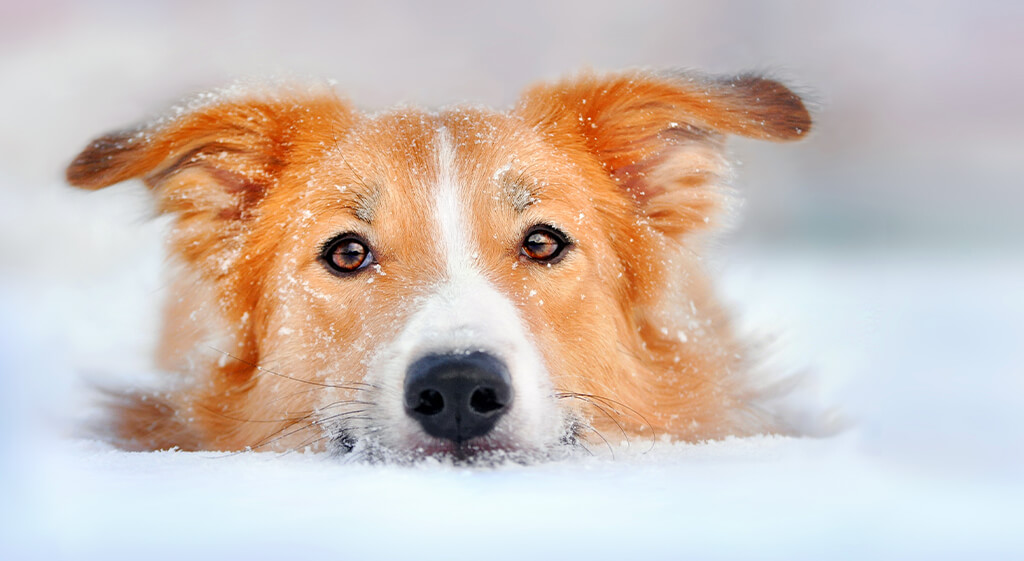As winter grips Broomfield, CO, it’s essential for pet owners to be aware of how cold weather can affect their dogs. This article focuses on dog frostbite – a condition that might not be top of mind, but is important to understand during the colder months. We’re here to assist you and your dog through every season. If your dog is showing signs of skin allergies, we encourage you to call Broomfield Veterinary Hospital at (303) 466-1764. Our team is ready to provide the care and support your dog needs to live a comfortable and happy life.
What is Dog Frostbite?
Frostbite in dogs happens when their skin and other tissues get too cold. Just like in humans, extreme cold can cause damage to body parts, especially the ears, tail, and paws. When a dog’s body gets cold, it works hard to keep the vital organs warm, which can mean less blood flow to the extremities. Without enough warm blood, these areas can freeze, leading to frostbite.
How to Spot Frostbite in Dogs
It’s important to be able to spot the signs of frostbite in your dog. Some of the first things you might notice are:
- Changes in Skin Color: One of the earliest signs of frostbite is a noticeable change in the skin color of your dog. The affected areas, commonly the ears, tail, paws, or nose, may appear pale, gray, or bluish. This discoloration happens because of reduced blood flow to these areas as the body tries to conserve heat.
- Texture Changes: Touch the suspect areas gently. In case of frostbite, they may feel unusually cold to the touch compared to the rest of the body. As frostbite progresses, these areas can also become hard and brittle due to ice crystals forming in the tissue.
- Swelling and Pain: As the frostbitten areas start to warm up and blood flow returns, they may become red and swollen. Your dog might react painfully to touch or become more irritable, especially when the affected area is handled.
- Blisters and Ulcers: In severe cases of frostbite, blisters or skin ulcers can develop. These are signs of deeper tissue damage and require immediate veterinary attention.
- Changes in Behavior: Apart from physical signs, a dog with frostbite might show behavioral changes. They might limp, whine, or avoid using the affected body part. In some cases, dogs become lethargic or show signs of discomfort.
Preventing Frostbite in Dogs
Prevention is always better than treatment. To keep your dog safe from frostbite:
- Limit Time Outdoors: During very cold weather, keep your dog’s trips outside short.
- Protective Clothing: Consider a coat or booties for your dog, especially if they have a short coat or are small in size.
- Keep Them Dry: Wet conditions can increase the risk of frostbite. Make sure your dog is dry and warm after being outside.
- Provide a Warm Shelter: If your dog spends a lot of time outdoors, ensure they have a warm, insulated shelter to protect them from the cold.
What to Do If You Spot These Signs
If you observe any of these symptoms in your dog, especially after exposure to cold weather, it’s crucial to act promptly:
- Warm the Area: Gradually warm the affected areas with warm (not hot) water. You can use a warm towel or place the area in lukewarm water. Avoid using direct heat sources like a hairdryer, as this can cause further damage.
- Dry Gently: After warming, pat the area dry gently. Avoid rubbing or massaging the frostbitten area, as this can exacerbate the damage.
- Seek Veterinary Care: Contact Broomfield Veterinary Hospital or your local vet immediately for further instructions and to arrange for a check-up. Professional assessment is essential, as frostbite can lead to serious complications if not treated properly.
- Monitor for Infection: Keep an eye on the affected area for signs of infection, such as increased redness, swelling, or pus.
Understanding these signs and knowing how to react can make a significant difference in the outcome for your dog. If you’re ever in doubt, it’s always better to err on the side of caution and reach out to us at Broomfield Veterinary Hospital at (303) 466-1764. We’re here to provide the care your dog needs, ensuring they stay healthy and happy throughout the winter season.
When to See a Vet
If you suspect your dog has frostbite, it’s essential to seek veterinary care. Frostbite can lead to serious complications, including infection and tissue damage. At Broomfield Veterinary Hospital, we can assess the severity of the frostbite and provide the necessary treatment to help your dog recover.
Cold Weather Tips for Dog Owners
Apart from frostbite, cold weather poses other risks to dogs. Here are some additional tips to keep your dog safe:
- Check their paws for ice and snow buildup after walks.
- Use pet-safe deicers on your sidewalks and driveways.
- Keep antifreeze and other chemicals out of reach; they can be toxic to dogs.
The Role of Regular Vet Visits
Regular check-ups at Broomfield Veterinary Hospital can help ensure your dog is healthy and ready to face the challenges of each season. Our team can provide personalized advice on keeping your dog safe in cold weather, and address any health concerns that may increase their risk of frostbite.
Broomfield Veterinary Hospital is Here to Help
Understanding and preventing dog frostbite is key to keeping your pet safe during the winter months. Remember, if you have any concerns about your dog’s health or want more information on how to protect them from the cold, don’t hesitate to call Broomfield Veterinary Hospital at (303) 466-1764. We’re committed to the health and happiness of your pets, all year round.





